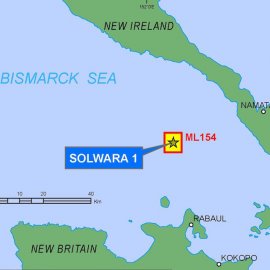Deep Sea Mining Update, Part One
-
English
-
ListenPause
[intro music] Welcome to World Ocean Radio… I’m Peter Neill, Director of the World Ocean Observatory. On of the most disconcerting proposals for exploitation of ocean resources is deep sea mining – access through extraction technology to material underwater and heretofore beyond the grasp of the world’s mining industry. One part of public opposition to the possibility is the demonstrated outcome of mining on land – the vast pits, the scarified landscape, the decapitated mountaintops, the corrupted watershed, and chemical deposits that often make such sites designated wastelands, sometimes qualifying for clean up by legislated super-funds which may or may not be adequate to the problem, or available. It does not take much imagination to visualize such destruction underwater. For me, one of the most surprising targets for ocean mining is sand, something one may assume to be ubiquitous on land. Consider beaches for example, as an intervening supply. But one can also understand the prohibitive outcry should large earth moving equipment suddenly one day arrive to scoop up the recreational potential of our coastal beaches. Far better to find a place far, far away from an inquiring public – Papua New Guinea for example – where mining the sea floor can be undertaken at scale with no important impact of protesting society. The local villagers of that place without significance or power. This is, of course, the strategy of Nautilus Minerals, the sponsors of Solwara 1, a deep ocean mining experiment located at a 1600 meter depth in the Bismarck Sea, all within the territorial waters of, you guessed it, Papua New Guinea. The project has attracted enormous international interest. The principle Nautilus, a Canadian company, sought numerous investors to include Anglo American, a global extraction corporation with successful enterprise in the recovery of diamonds, copper, platinum, coal, iron, manganese and nickel. Other investors include Metalloinvest Holding, a Russian mining company, and MB Holdings from Oman, providing bridge loans that, according to a recent press report, as of May 15, 2018, amount to $11.25 million at 8% ‘USM Holdings, the ultimate parent holding company of Metalloinvest Holding, registered in Cyprus, is controlled by Russian billionaires Alisher Usmanov (49%) and Vladimir Skoch (30%). In the 6 April sanctions imposed by the US, Vladimir Skoch's son was one of the seven Russian tycoons sanctioned,…” Also, in the past month, Anglo-American has divested its ownership share. Not information conducive to public confidence. At the outset the project met of course with immediate growing opposition from national and international environmental groups such as Mining Watch Canada, the Mining Justice Alliance, and the Deep Sea Mining Campaign, as well as determined internal New Guinean testimony voiced at hearings and legal actions by the New-Ireland community-based Solwara Warriors. Andy Whitmore of the Deep Sea Mining campaign stressed, “Anglo's decision to divest, on top of Nautilus's myriad problems, proves the company is running out of both credit and credibility. It is not just the company that is sinking, but the project and the concept of deep sea mining itself.” If that is the case, this defeat is both spectacular and welcome. Let us ask some questions about this situation: First, why is such a project necessary at all? Why would government support economic development that is so destructive to other aspects of the local and national economy? Given any meaningful due diligence, how could government permit such risk in partnership with such risky investors? Second, what is the financial rationale for such investment? Serious shareholder value was placed as a long odds bet on hypothetical success. Russian oligarchs may not care, but presumably Canadian investors and financial oversight agencies do. The situation is rife with potential for fraud. Third, what will we learn from this fiasco? Will it be similar to Shell Oil’s multi-billion dollar lost in drilling for Arctic oil? Just another inconsequential footnote on the great global balance sheet where profit and loss by natural resource exploitation is calculated and accounted for as a meaningless number without meaningful consequence. Finally, let’s ask, what happens next? We will discuss these issues, and more in future editions of World Ocean Radio. WORLD OCEAN RADIO IS DISTRIBUTED BY THE PUBLIC RADIO EXCHANGE AND THE PACIFICA NETWORK FOR USE BY COLLEGE AND COMMUNITY RADIO STATIONS WORLDWIDE. FIND US WHEREVER YOU LISTEN TO YOUR FAVORITE PODCASTS AND AT WORLD OCEAN OBSERVATORY DOT ORG. [outro music]
There has long been public opposition to deep sea mining, a technology that extracts resources from the ocean floor. In this episode of World Ocean Radio host Peter Neill discusses the Solwara 1 deep sea mining experiment in Papua New Guinea and poses questions about the meaning of the project and its impacts on the environment and both local and national economies. And he highlights some of the various groups mounting opposition and legal action against the principle Nautilus Minerals and the various holding and investment companies involved with the project.
Deep Sea Mining Update, part two is available here.
The weekly blog post of this episode is available at Medium.com/@TheW2O.
About World Ocean Radio
Peter Neill, Director of the World Ocean Observatory and host of World Ocean Radio, provides coverage of a broad spectrum of ocean issues from science and education to advocacy and exemplary projects. World Ocean Radio is a weekly series of five-minute audio essays available for syndicated use at no cost by college and community radio stations worldwide.
Image Credit
Papua New Guinea Mine Watch
Resources from this Episode
< Mining Watch Canada
< Deep Sea Mining Campaign
< Deep Sea Mining Company Sinking in Deep Water
< Alliance of Solwara Warriors Lodge Objection / Deep Sea Conservation Coalition
< About Solwara 1
< Deep Sea Mining and the Controversial Solwara 1 Project in Papua New Guinea
< World Ocean Radio (July 2017): Deep Sea Mining in Papua New Guinea
- Login to post comments



